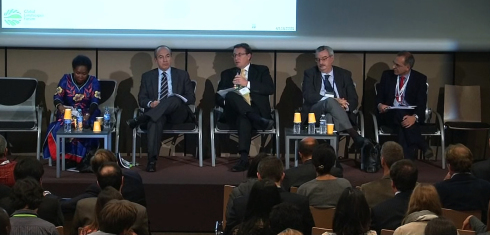UNEP organized a high-level dialogue at the Global Landscape Forum in Paris in December 2015 highlighting the need to seek greater alignment between stimulating agricultural production through fiscal incentives, with efforts to reduce and remove forest carbon emissions.
By Ivo Mulder, UNEP-FI
Agriculture is estimated to be the direct driver for around 80% of deforestation worldwide. In order for countries to contribute to mitigating climate change in the land use sector, it is important to tackle both the direct and underlying or indirect drivers associated with the production of agricultural commodities such as palm oil, soy and beef. While these issues are context-specific for each of the UN-REDD Programme’s partner countries, these underlying drivers include government fiscal policies and incentives that directly or indirectly promote agricultural expansion into forests.
At present, domestic subsidies to the agricultural sector vastly that contribute to deforestation outweigh international REDD+ funding seeking to prevent deforestation. Brazil and Indonesia together provided over US$ 40 billion in subsidies to palm oil, timber, soy and beef sectors between 2009 and 2012, which is more than a hundred times the US$ 346 million these countries received through REDD+.
The Paris panel sought to address if and what can be done to seek greater compatibility between climate funding and domestic finance that contributes to significant carbon emissions in the land-based economy with the need to achieve higher agricultural output. It was chaired by Achim Steiner (UNEP’s Executive Director and UN Under-Secretary General) and included Felipe Calderon (Chair, Global Commission on the Economy and Climate and former President of Mexico), Maria Kiwanuka (Senior Presidential Advisor and former Finance Minister, Uganda), Braulio Dias (Executive Secretary, CBD) and Pavan Sukhdev (CEO GIST and UNEP Goodwill Ambassador).
While the need for fiscal reform in the energy sector has been known and debated for some time, including reducing subsidies for fossil fuels while simultaneously providing public funding to scale up investments in the renewable energy and energy efficiency space, the need for fiscal reform in the land-based economy has so far received far less attention. Very few countries, if any at present, call out the need to review and reform existing fiscal incentives as part of their REDD+ readiness activities, based on reviewing 43 country REDD+ readiness plans.
At the same time fiscal incentives supporting agricultural production have the potential to promote sustainable land use and support multiple land use sector objectives, if they are conceptualized and designed to do so. Decoupling economic growth from deforestation and land degradation is possible, and provides a pathway toward sustainable land use and sustainable inclusive economic growth. The panel highlighted that political willingness across different ministries is key to making this happen in practice. First of all there needs to be a greater level of awareness among policy makers, legislators and other stakeholders about the relationship between agricultural fiscal incentives and REDD+. Second, the panel highlighted the need for political willingness at the highest level and across ministries to harmonize allocation of budgets and governmental financial support for land-based sectors such as agriculture and forestry.
As we enter 2016, the UN-REDD Programme has the opportunity to support countries when designing their REDD+ national strategy where there are inconsistencies in their fiscal policies — and to bring greater coherence across sector policies to promote agricultural production and economic growth, while enhancing the removal and reduction of forest carbon emissions. This can support the smart design of REDD+ policies and measures in investment plans to tackle these underlying deforestation drivers.

